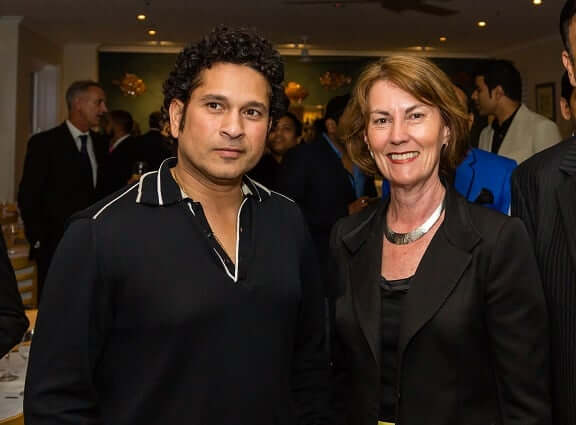ROBYN SEFIANI writes about how an encounter with Sachin Tendulkar, cricketing great, taught her lessons that apply to the workplace

I’ve been a cricket tragic for as long as I can remember. As a teenager in the summer holidays, I’d board the train with my older sister and two female cousins and we’d head to Sydney for our annual feast of Sheffield Shield and Test matches. I’d hang over the Sydney Cricket Ground boundary fence for blonde spinner Kerry O’Keefe’s autograph and wait at the gate of the Members’ stand for a chat with the World 11 at the end of the day’s play.
Little did I know I would one day meet one of the greatest batsmen of all time: India’s “Little Master” Sachin Tendulkar. It was at a private dinner at Doyle’s Watson’s Bay recently for a group of 50 business types in a fundraiser for Sachin’s Foundation beneficiary Apnalaya.
Having now met Sachin, heard him speak and watched him in the company of business people who also happen to be avid cricket fans, I can understand why he is so revered in India. He has a plethora of top awards, honours and accolades and 25 million Facebook fans.
In a Q&A session, Sachin talked widely about the game, how it’s changed and what this means for international cricket. He’s a diminutive, humble, articulate, warm and funny man, with a gentle calm about him that fills the room. It was easy to see how he could maintain focus and concentration against the world’s best bowlers to notch up more than 34,000 runs in his 664 international cricket matches.
Much of what he said about succeeding in world-class cricket resonated with me as being equally applicable to a high performance work culture, like ours at Sefiani Communications Group. Here are some of the points Sachin made and my take on how that applies to the workplace:

To get to the top it takes focus, discipline, hard work, self-belief and sacrifice.
Agreed, but hopefully not too much sacrifice of work/life balance.
Lesser teams (in the World Cup) must be given a fair platform to express their talent.
Focus on and nurture people’s strengths; don’t exclude them for their weaknesses.
“After Sir Don Bradman, the two batsmen I aspired to be like were Sunil Gavaskar and Brian Lara – I wanted to be a combination of both.”
We all need role models and mentors. If they’re not immediately obvious, go seek them.

Youngsters need tonic to go out on the field and push themselves harder.
We need to equip and motivate bright young people to be the best they can be – not for them to expect others will make it happen for them.
The most important thing is for you to be happy with your performance, but never be satisfied with your performance.
There’s no room for complacency in a successful business.
Nothing should hold back your passion for the game, and always remember you’re doing it for the team. The dressing room matters.
Love what you do and bring the team with you. A positive, collegial team achieves results.

Set yourself a challenge. Sachin said that after one particular Test match his brother counselled, “There’s no bowler getting you out, you are getting yourself out.” Sachin promised himself that he was not going to get out to anyone. “I scored 242 in the first innings and 59 not-out in the second. I achieved the challenge I’d set myself.”
Set yourself challenges and goals, and seek wise counsel from those you respect.
Sydney is the greatest cricket ground outside India. When you do well in Australia the whole world takes notice.
We’re a long way from the rest of the world with a small population, but Australians punch abovetheir weight.
The game of cricket has changed. Batsmen have become more innovative and creative with different planning. Higher batting scores are not a coincidence. Bowlers have had to respond and become more creative, developing a lot of variations.
So too has the global and Australian media landscape changed, necessitating a rapid response from communication agencies and corporations to adapt to new ways people seek and consume information.

“We need some sort of balance in the game. We need bowlers to stand some chance to make batsmen’s life difficult. I don’t see that happening.”
A fair fight is a good fight. A tough negotiation with a good outcome for both sides is a win/win.
Which forms of cricket will survive and which will disappear? Sachin says Test cricket will definitely survive (hooray – my favourite form of the game), T20 will survive, but ODI will need some changes.
Which PR firms around the world will survive in the new communications paradigm? Clearly, those who successfully adapt, change, reinvent and reinvigorate, which is both a healthy challenge and major opportunity which we at Sefiani are enthusiastically embracing.
Nothing it seems, not even cricket, can resist the force of change.
Life lessons from the Master

Reading Time: 4 minutes



